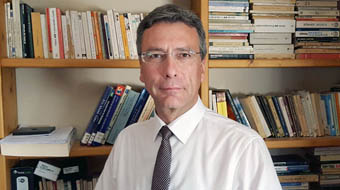
Research professor of Spanish Research Counsil (CSIC), Juan José Hernández Rey, is the new director of Corpuscular Physics Institute (IFIC), joint centre of CSIC and Universitat de València. The appointment was effective by the beginning of July and has duration of four years. IFIC has been recently distinguished as Severo Ochoa Centre of Excellence.
Juan José Hernández Rey (Madrid, 1957) studied in Autonomous University of Madrid and started his research career at the Basic Investigation Unit of the old Nuclear Energy Board, where he carried out his doctoral thesis in experiments of the European Particle Physics Laboratory CERN (Switzerland), in which he later worked as a ‘Fellow’ and ‘Scientific Associate’. His field of research is particle and astroparticle expeperimental physics. He carried out experiments in diverse particle accelerators such as the Super Proton Synchrotron of CERN, the Tevatron of the Fermi National Accelerator Centre FNAL (United States) and the Large-Electron Positron (LEP) of CERN. The last one already as a member of IFIC. His scientific interests comprise diverse fields as the study of particles with charm, the study of the electroweak boson Z and the search of supersymetric particles.
During the last decade, Hernández Rey has worked on the search of cosmic high enerby neutrinos. It was spokesperson of the ANTARES Collaboration, which built the first submarine telescope of neutrinos of the world, and he is member of the Collaboration KM3NeT, which aims to display a neutrino telescope of a size of several cubic kilometres in the sea floor of Mediterranean Sea. Nowadays, he is interested on the indirect search of dark matter through high energy neutrinos produced in astrophysical objects as the Sun or the centre of our Galaxy. He is member of Particle Data Group, the international team that examines and compiles properties of elementary particles.
Juan José Hernández Rey replaces as director of IFIC to Francisco Botella Olcina (Alcoy, 1956), professor of Theoretical Physics at Universitat de València, who has been responsible of the centre for eight years. In this time, IFIC contributed significantly to the construction, launch and data analysis of the ATLAS experiment of LHC, one of the two big detectors of the accelerator of CERN where discovered the Higgs boson in 2012.
Other important scientific findings in which IFIC was the main actor are: the observation of the symmetry breaking of the time reversal in the fundamental laws of Physics, lead by IFIC physicians in the BaBar experiment of the Stanford Lineal Accelerator Center (SLAC), considered other of the landmarks of 2012; or the observation of oscillation properties of neutrinos in the experiment T2K (Japan), among others.
IFIC is pioneer in Spain in the experimental research on matter constituents, with a career that started in the 1950s. The most recent stage of IFIC started in 1985, when Universitat de València and CSIC signed a collaboration convention that gives place to the actual institute. Some of its scientific objectives are the study of Higgs boson, of quark top, the search of new particles and matter models, the study of neutrinos and their use as cosmic messengers, nuclear physics and its applications, as well as the development of technology for new detectors and particle accelerators.
Last update: 7 de july de 2015 11:02.
News release


















